Accounting Standards: A Global Perspective (Course: Finance 101)
VerifiedAdded on 2019/09/22
|8
|2731
|275
Essay
AI Summary
This blog post provides a comprehensive overview of different accounting standards used globally. It begins by emphasizing the importance of accounting standards in financial reporting, ensuring clarity and comparability for investors and stakeholders. The post then delves into specific standards, including US GAAP, detailing the roles of the SEC, FASB, and other key bodies. It explores the evolution of IFRS, highlighting its role in international standardization. The blog also covers Government Accounting Standards, Indian Accounting Standards (including their applicability and phases), and Canadian Accounting Standards. The document provides a detailed explanation of each standard, including their objectives, applicability, and the governing bodies responsible for their implementation, offering a valuable resource for understanding the global landscape of accounting practices.
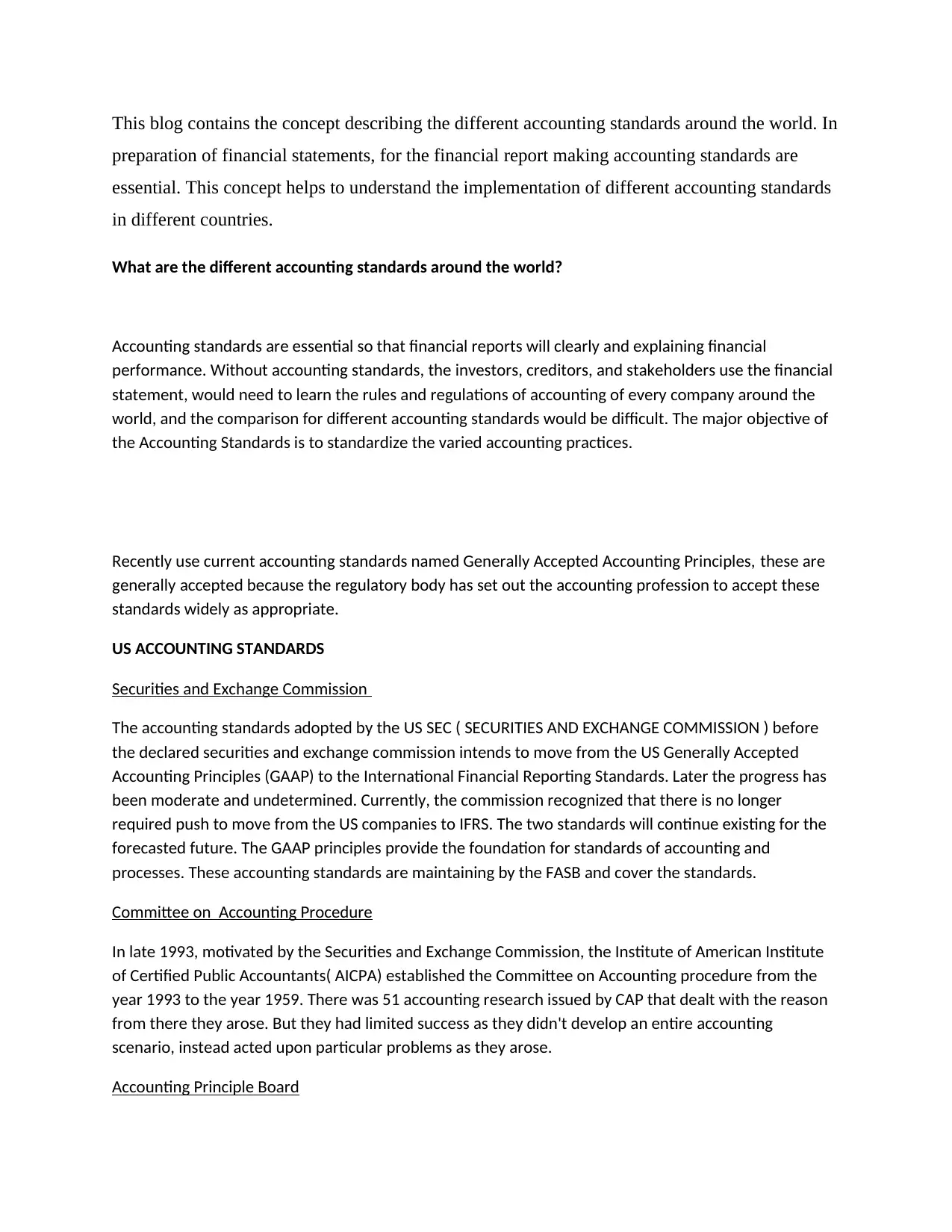
This blog contains the concept describing the different accounting standards around the world. In
preparation of financial statements, for the financial report making accounting standards are
essential. This concept helps to understand the implementation of different accounting standards
in different countries.
What are the different accounting standards around the world?
Accounting standards are essential so that financial reports will clearly and explaining financial
performance. Without accounting standards, the investors, creditors, and stakeholders use the financial
statement, would need to learn the rules and regulations of accounting of every company around the
world, and the comparison for different accounting standards would be difficult. The major objective of
the Accounting Standards is to standardize the varied accounting practices.
Recently use current accounting standards named Generally Accepted Accounting Principles, these are
generally accepted because the regulatory body has set out the accounting profession to accept these
standards widely as appropriate.
US ACCOUNTING STANDARDS
Securities and Exchange Commission
The accounting standards adopted by the US SEC ( SECURITIES AND EXCHANGE COMMISSION ) before
the declared securities and exchange commission intends to move from the US Generally Accepted
Accounting Principles (GAAP) to the International Financial Reporting Standards. Later the progress has
been moderate and undetermined. Currently, the commission recognized that there is no longer
required push to move from the US companies to IFRS. The two standards will continue existing for the
forecasted future. The GAAP principles provide the foundation for standards of accounting and
processes. These accounting standards are maintaining by the FASB and cover the standards.
Committee on Accounting Procedure
In late 1993, motivated by the Securities and Exchange Commission, the Institute of American Institute
of Certified Public Accountants( AICPA) established the Committee on Accounting procedure from the
year 1993 to the year 1959. There was 51 accounting research issued by CAP that dealt with the reason
from there they arose. But they had limited success as they didn't develop an entire accounting
scenario, instead acted upon particular problems as they arose.
Accounting Principle Board
preparation of financial statements, for the financial report making accounting standards are
essential. This concept helps to understand the implementation of different accounting standards
in different countries.
What are the different accounting standards around the world?
Accounting standards are essential so that financial reports will clearly and explaining financial
performance. Without accounting standards, the investors, creditors, and stakeholders use the financial
statement, would need to learn the rules and regulations of accounting of every company around the
world, and the comparison for different accounting standards would be difficult. The major objective of
the Accounting Standards is to standardize the varied accounting practices.
Recently use current accounting standards named Generally Accepted Accounting Principles, these are
generally accepted because the regulatory body has set out the accounting profession to accept these
standards widely as appropriate.
US ACCOUNTING STANDARDS
Securities and Exchange Commission
The accounting standards adopted by the US SEC ( SECURITIES AND EXCHANGE COMMISSION ) before
the declared securities and exchange commission intends to move from the US Generally Accepted
Accounting Principles (GAAP) to the International Financial Reporting Standards. Later the progress has
been moderate and undetermined. Currently, the commission recognized that there is no longer
required push to move from the US companies to IFRS. The two standards will continue existing for the
forecasted future. The GAAP principles provide the foundation for standards of accounting and
processes. These accounting standards are maintaining by the FASB and cover the standards.
Committee on Accounting Procedure
In late 1993, motivated by the Securities and Exchange Commission, the Institute of American Institute
of Certified Public Accountants( AICPA) established the Committee on Accounting procedure from the
year 1993 to the year 1959. There was 51 accounting research issued by CAP that dealt with the reason
from there they arose. But they had limited success as they didn't develop an entire accounting
scenario, instead acted upon particular problems as they arose.
Accounting Principle Board
Paraphrase This Document
Need a fresh take? Get an instant paraphrase of this document with our AI Paraphraser
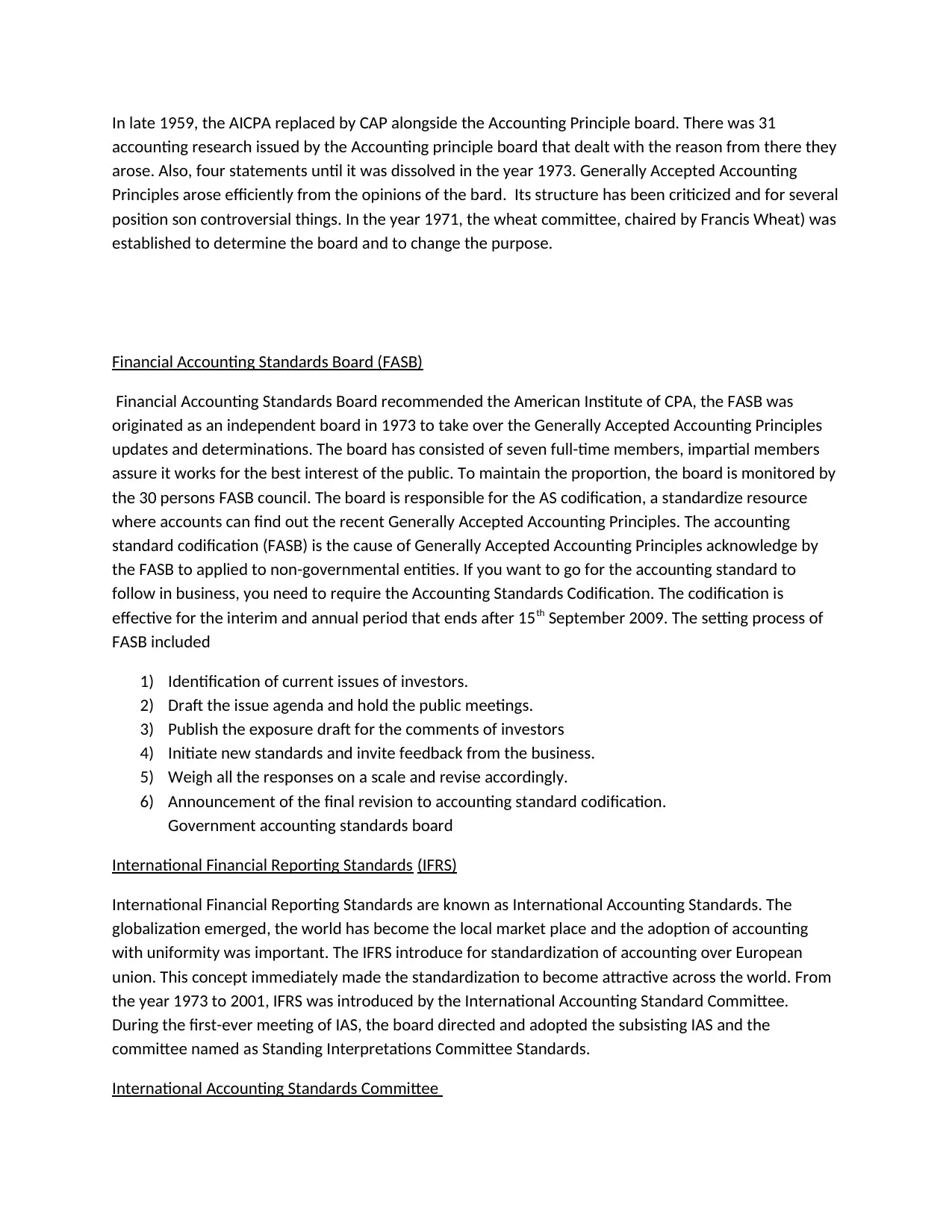
In late 1959, the AICPA replaced by CAP alongside the Accounting Principle board. There was 31
accounting research issued by the Accounting principle board that dealt with the reason from there they
arose. Also, four statements until it was dissolved in the year 1973. Generally Accepted Accounting
Principles arose efficiently from the opinions of the bard. Its structure has been criticized and for several
position son controversial things. In the year 1971, the wheat committee, chaired by Francis Wheat) was
established to determine the board and to change the purpose.
Financial Accounting Standards Board (FASB)
Financial Accounting Standards Board recommended the American Institute of CPA, the FASB was
originated as an independent board in 1973 to take over the Generally Accepted Accounting Principles
updates and determinations. The board has consisted of seven full-time members, impartial members
assure it works for the best interest of the public. To maintain the proportion, the board is monitored by
the 30 persons FASB council. The board is responsible for the AS codification, a standardize resource
where accounts can find out the recent Generally Accepted Accounting Principles. The accounting
standard codification (FASB) is the cause of Generally Accepted Accounting Principles acknowledge by
the FASB to applied to non-governmental entities. If you want to go for the accounting standard to
follow in business, you need to require the Accounting Standards Codification. The codification is
effective for the interim and annual period that ends after 15th September 2009. The setting process of
FASB included
1) Identification of current issues of investors.
2) Draft the issue agenda and hold the public meetings.
3) Publish the exposure draft for the comments of investors
4) Initiate new standards and invite feedback from the business.
5) Weigh all the responses on a scale and revise accordingly.
6) Announcement of the final revision to accounting standard codification.
Government accounting standards board
International Financial Reporting Standards (IFRS)
International Financial Reporting Standards are known as International Accounting Standards. The
globalization emerged, the world has become the local market place and the adoption of accounting
with uniformity was important. The IFRS introduce for standardization of accounting over European
union. This concept immediately made the standardization to become attractive across the world. From
the year 1973 to 2001, IFRS was introduced by the International Accounting Standard Committee.
During the first-ever meeting of IAS, the board directed and adopted the subsisting IAS and the
committee named as Standing Interpretations Committee Standards.
International Accounting Standards Committee
accounting research issued by the Accounting principle board that dealt with the reason from there they
arose. Also, four statements until it was dissolved in the year 1973. Generally Accepted Accounting
Principles arose efficiently from the opinions of the bard. Its structure has been criticized and for several
position son controversial things. In the year 1971, the wheat committee, chaired by Francis Wheat) was
established to determine the board and to change the purpose.
Financial Accounting Standards Board (FASB)
Financial Accounting Standards Board recommended the American Institute of CPA, the FASB was
originated as an independent board in 1973 to take over the Generally Accepted Accounting Principles
updates and determinations. The board has consisted of seven full-time members, impartial members
assure it works for the best interest of the public. To maintain the proportion, the board is monitored by
the 30 persons FASB council. The board is responsible for the AS codification, a standardize resource
where accounts can find out the recent Generally Accepted Accounting Principles. The accounting
standard codification (FASB) is the cause of Generally Accepted Accounting Principles acknowledge by
the FASB to applied to non-governmental entities. If you want to go for the accounting standard to
follow in business, you need to require the Accounting Standards Codification. The codification is
effective for the interim and annual period that ends after 15th September 2009. The setting process of
FASB included
1) Identification of current issues of investors.
2) Draft the issue agenda and hold the public meetings.
3) Publish the exposure draft for the comments of investors
4) Initiate new standards and invite feedback from the business.
5) Weigh all the responses on a scale and revise accordingly.
6) Announcement of the final revision to accounting standard codification.
Government accounting standards board
International Financial Reporting Standards (IFRS)
International Financial Reporting Standards are known as International Accounting Standards. The
globalization emerged, the world has become the local market place and the adoption of accounting
with uniformity was important. The IFRS introduce for standardization of accounting over European
union. This concept immediately made the standardization to become attractive across the world. From
the year 1973 to 2001, IFRS was introduced by the International Accounting Standard Committee.
During the first-ever meeting of IAS, the board directed and adopted the subsisting IAS and the
committee named as Standing Interpretations Committee Standards.
International Accounting Standards Committee
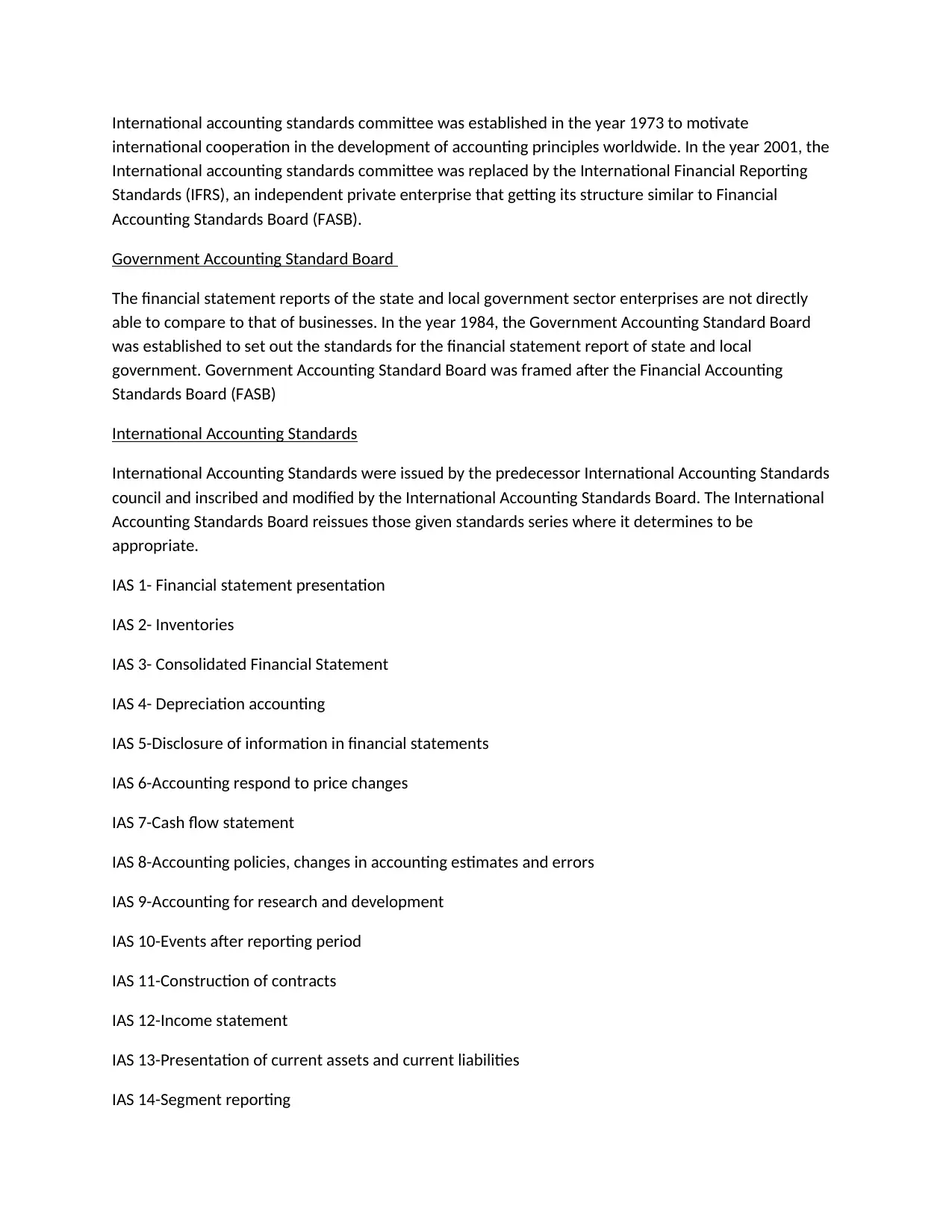
International accounting standards committee was established in the year 1973 to motivate
international cooperation in the development of accounting principles worldwide. In the year 2001, the
International accounting standards committee was replaced by the International Financial Reporting
Standards (IFRS), an independent private enterprise that getting its structure similar to Financial
Accounting Standards Board (FASB).
Government Accounting Standard Board
The financial statement reports of the state and local government sector enterprises are not directly
able to compare to that of businesses. In the year 1984, the Government Accounting Standard Board
was established to set out the standards for the financial statement report of state and local
government. Government Accounting Standard Board was framed after the Financial Accounting
Standards Board (FASB)
International Accounting Standards
International Accounting Standards were issued by the predecessor International Accounting Standards
council and inscribed and modified by the International Accounting Standards Board. The International
Accounting Standards Board reissues those given standards series where it determines to be
appropriate.
IAS 1- Financial statement presentation
IAS 2- Inventories
IAS 3- Consolidated Financial Statement
IAS 4- Depreciation accounting
IAS 5-Disclosure of information in financial statements
IAS 6-Accounting respond to price changes
IAS 7-Cash flow statement
IAS 8-Accounting policies, changes in accounting estimates and errors
IAS 9-Accounting for research and development
IAS 10-Events after reporting period
IAS 11-Construction of contracts
IAS 12-Income statement
IAS 13-Presentation of current assets and current liabilities
IAS 14-Segment reporting
international cooperation in the development of accounting principles worldwide. In the year 2001, the
International accounting standards committee was replaced by the International Financial Reporting
Standards (IFRS), an independent private enterprise that getting its structure similar to Financial
Accounting Standards Board (FASB).
Government Accounting Standard Board
The financial statement reports of the state and local government sector enterprises are not directly
able to compare to that of businesses. In the year 1984, the Government Accounting Standard Board
was established to set out the standards for the financial statement report of state and local
government. Government Accounting Standard Board was framed after the Financial Accounting
Standards Board (FASB)
International Accounting Standards
International Accounting Standards were issued by the predecessor International Accounting Standards
council and inscribed and modified by the International Accounting Standards Board. The International
Accounting Standards Board reissues those given standards series where it determines to be
appropriate.
IAS 1- Financial statement presentation
IAS 2- Inventories
IAS 3- Consolidated Financial Statement
IAS 4- Depreciation accounting
IAS 5-Disclosure of information in financial statements
IAS 6-Accounting respond to price changes
IAS 7-Cash flow statement
IAS 8-Accounting policies, changes in accounting estimates and errors
IAS 9-Accounting for research and development
IAS 10-Events after reporting period
IAS 11-Construction of contracts
IAS 12-Income statement
IAS 13-Presentation of current assets and current liabilities
IAS 14-Segment reporting
⊘ This is a preview!⊘
Do you want full access?
Subscribe today to unlock all pages.

Trusted by 1+ million students worldwide
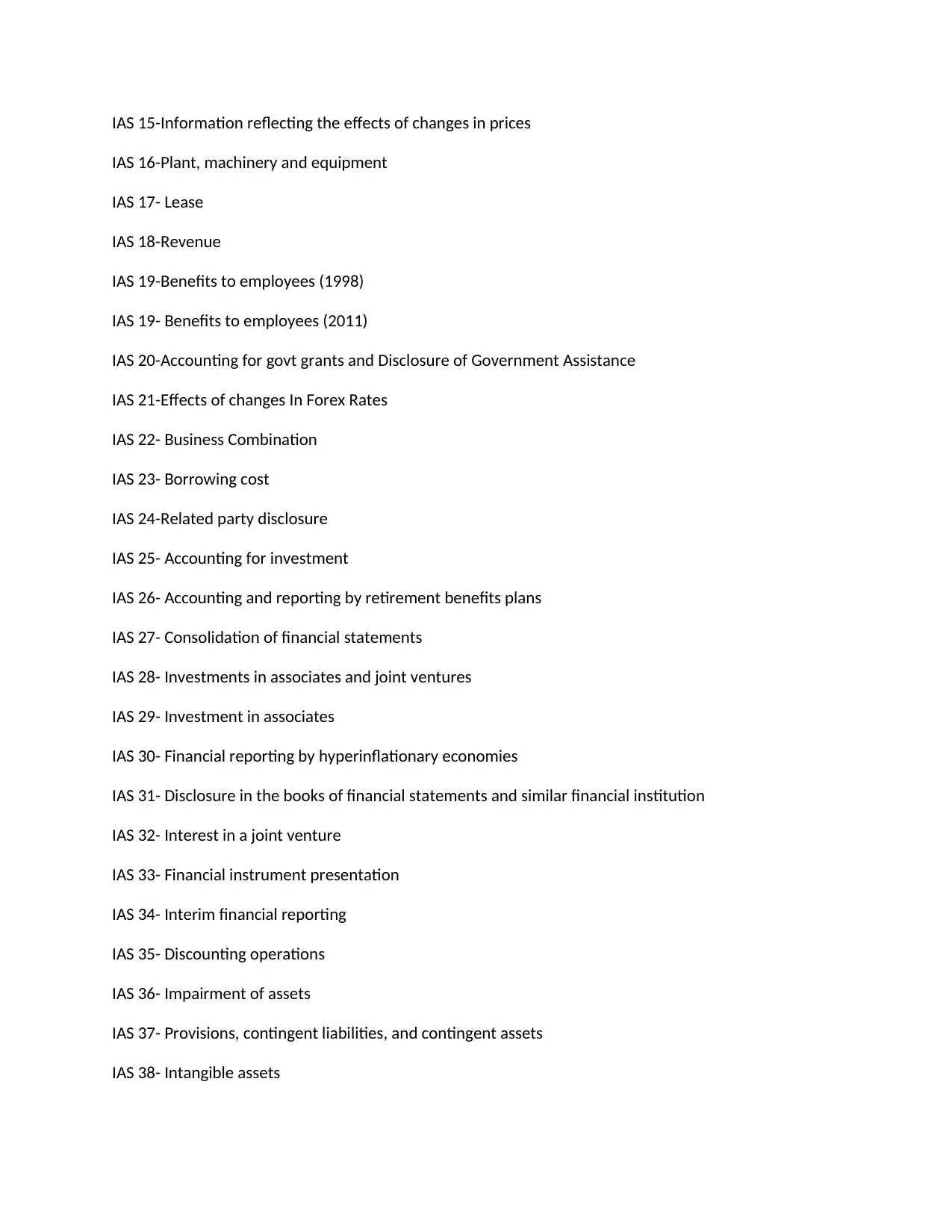
IAS 15-Information reflecting the effects of changes in prices
IAS 16-Plant, machinery and equipment
IAS 17- Lease
IAS 18-Revenue
IAS 19-Benefits to employees (1998)
IAS 19- Benefits to employees (2011)
IAS 20-Accounting for govt grants and Disclosure of Government Assistance
IAS 21-Effects of changes In Forex Rates
IAS 22- Business Combination
IAS 23- Borrowing cost
IAS 24-Related party disclosure
IAS 25- Accounting for investment
IAS 26- Accounting and reporting by retirement benefits plans
IAS 27- Consolidation of financial statements
IAS 28- Investments in associates and joint ventures
IAS 29- Investment in associates
IAS 30- Financial reporting by hyperinflationary economies
IAS 31- Disclosure in the books of financial statements and similar financial institution
IAS 32- Interest in a joint venture
IAS 33- Financial instrument presentation
IAS 34- Interim financial reporting
IAS 35- Discounting operations
IAS 36- Impairment of assets
IAS 37- Provisions, contingent liabilities, and contingent assets
IAS 38- Intangible assets
IAS 16-Plant, machinery and equipment
IAS 17- Lease
IAS 18-Revenue
IAS 19-Benefits to employees (1998)
IAS 19- Benefits to employees (2011)
IAS 20-Accounting for govt grants and Disclosure of Government Assistance
IAS 21-Effects of changes In Forex Rates
IAS 22- Business Combination
IAS 23- Borrowing cost
IAS 24-Related party disclosure
IAS 25- Accounting for investment
IAS 26- Accounting and reporting by retirement benefits plans
IAS 27- Consolidation of financial statements
IAS 28- Investments in associates and joint ventures
IAS 29- Investment in associates
IAS 30- Financial reporting by hyperinflationary economies
IAS 31- Disclosure in the books of financial statements and similar financial institution
IAS 32- Interest in a joint venture
IAS 33- Financial instrument presentation
IAS 34- Interim financial reporting
IAS 35- Discounting operations
IAS 36- Impairment of assets
IAS 37- Provisions, contingent liabilities, and contingent assets
IAS 38- Intangible assets
Paraphrase This Document
Need a fresh take? Get an instant paraphrase of this document with our AI Paraphraser
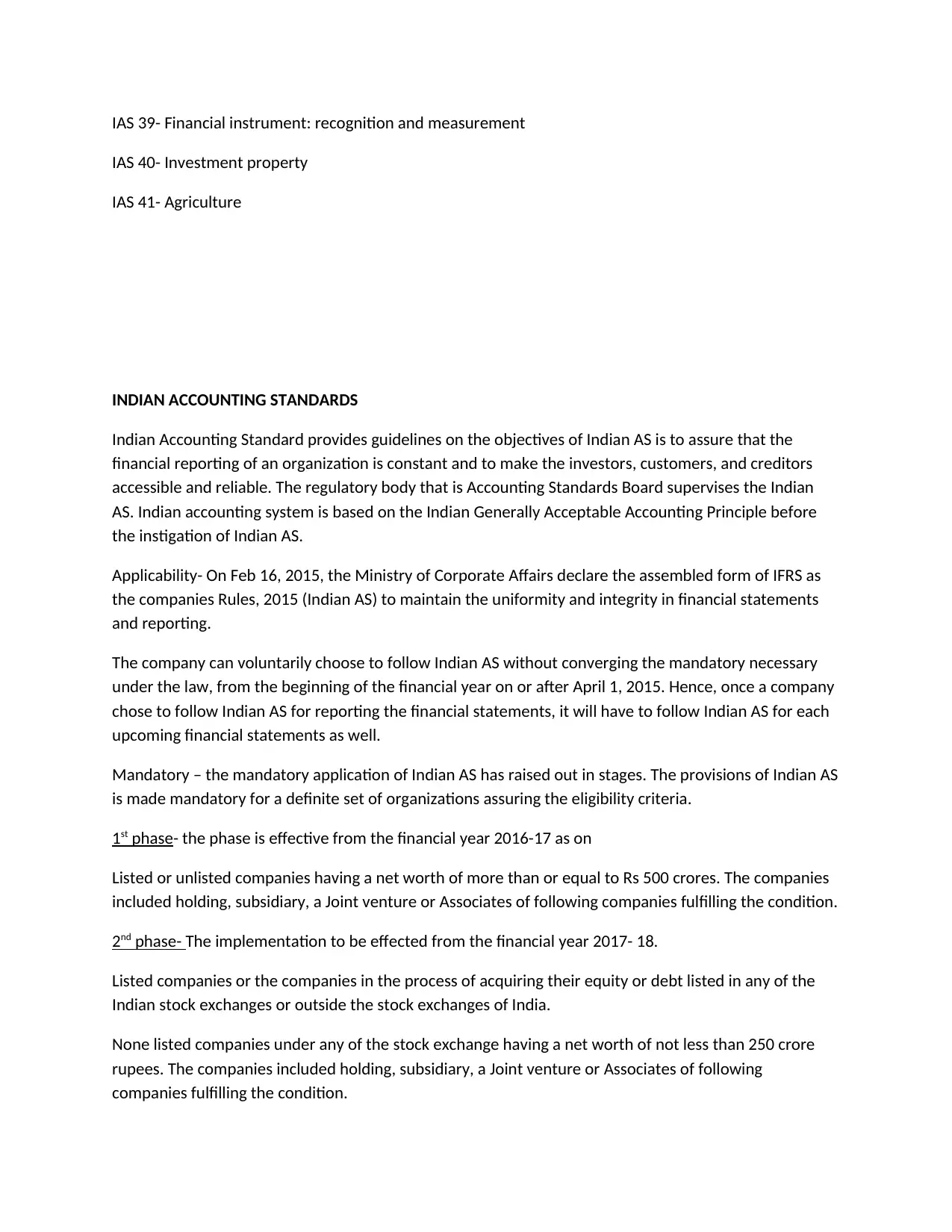
IAS 39- Financial instrument: recognition and measurement
IAS 40- Investment property
IAS 41- Agriculture
INDIAN ACCOUNTING STANDARDS
Indian Accounting Standard provides guidelines on the objectives of Indian AS is to assure that the
financial reporting of an organization is constant and to make the investors, customers, and creditors
accessible and reliable. The regulatory body that is Accounting Standards Board supervises the Indian
AS. Indian accounting system is based on the Indian Generally Acceptable Accounting Principle before
the instigation of Indian AS.
Applicability- On Feb 16, 2015, the Ministry of Corporate Affairs declare the assembled form of IFRS as
the companies Rules, 2015 (Indian AS) to maintain the uniformity and integrity in financial statements
and reporting.
The company can voluntarily choose to follow Indian AS without converging the mandatory necessary
under the law, from the beginning of the financial year on or after April 1, 2015. Hence, once a company
chose to follow Indian AS for reporting the financial statements, it will have to follow Indian AS for each
upcoming financial statements as well.
Mandatory – the mandatory application of Indian AS has raised out in stages. The provisions of Indian AS
is made mandatory for a definite set of organizations assuring the eligibility criteria.
1st phase- the phase is effective from the financial year 2016-17 as on
Listed or unlisted companies having a net worth of more than or equal to Rs 500 crores. The companies
included holding, subsidiary, a Joint venture or Associates of following companies fulfilling the condition.
2nd phase- The implementation to be effected from the financial year 2017- 18.
Listed companies or the companies in the process of acquiring their equity or debt listed in any of the
Indian stock exchanges or outside the stock exchanges of India.
None listed companies under any of the stock exchange having a net worth of not less than 250 crore
rupees. The companies included holding, subsidiary, a Joint venture or Associates of following
companies fulfilling the condition.
IAS 40- Investment property
IAS 41- Agriculture
INDIAN ACCOUNTING STANDARDS
Indian Accounting Standard provides guidelines on the objectives of Indian AS is to assure that the
financial reporting of an organization is constant and to make the investors, customers, and creditors
accessible and reliable. The regulatory body that is Accounting Standards Board supervises the Indian
AS. Indian accounting system is based on the Indian Generally Acceptable Accounting Principle before
the instigation of Indian AS.
Applicability- On Feb 16, 2015, the Ministry of Corporate Affairs declare the assembled form of IFRS as
the companies Rules, 2015 (Indian AS) to maintain the uniformity and integrity in financial statements
and reporting.
The company can voluntarily choose to follow Indian AS without converging the mandatory necessary
under the law, from the beginning of the financial year on or after April 1, 2015. Hence, once a company
chose to follow Indian AS for reporting the financial statements, it will have to follow Indian AS for each
upcoming financial statements as well.
Mandatory – the mandatory application of Indian AS has raised out in stages. The provisions of Indian AS
is made mandatory for a definite set of organizations assuring the eligibility criteria.
1st phase- the phase is effective from the financial year 2016-17 as on
Listed or unlisted companies having a net worth of more than or equal to Rs 500 crores. The companies
included holding, subsidiary, a Joint venture or Associates of following companies fulfilling the condition.
2nd phase- The implementation to be effected from the financial year 2017- 18.
Listed companies or the companies in the process of acquiring their equity or debt listed in any of the
Indian stock exchanges or outside the stock exchanges of India.
None listed companies under any of the stock exchange having a net worth of not less than 250 crore
rupees. The companies included holding, subsidiary, a Joint venture or Associates of following
companies fulfilling the condition.
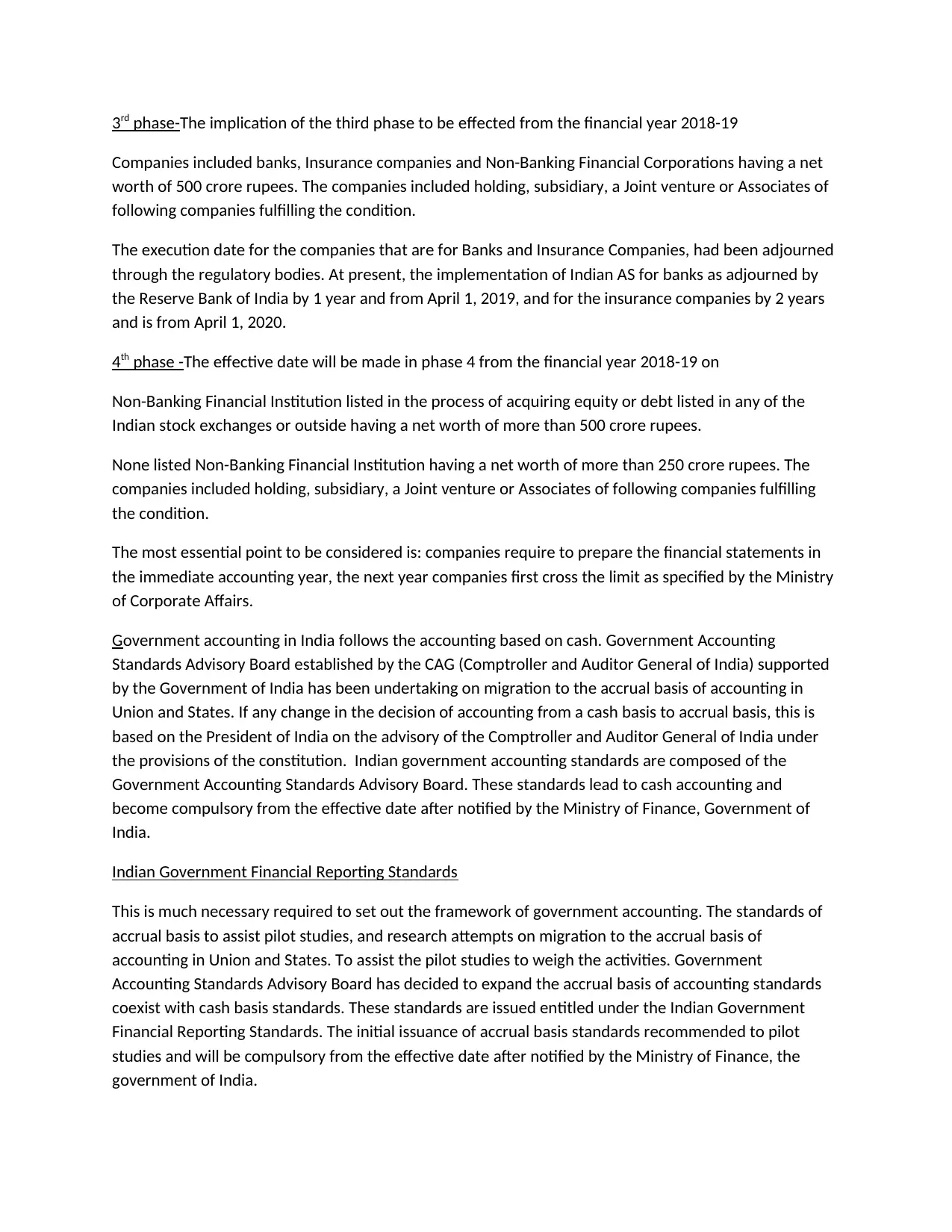
3rd phase-The implication of the third phase to be effected from the financial year 2018-19
Companies included banks, Insurance companies and Non-Banking Financial Corporations having a net
worth of 500 crore rupees. The companies included holding, subsidiary, a Joint venture or Associates of
following companies fulfilling the condition.
The execution date for the companies that are for Banks and Insurance Companies, had been adjourned
through the regulatory bodies. At present, the implementation of Indian AS for banks as adjourned by
the Reserve Bank of India by 1 year and from April 1, 2019, and for the insurance companies by 2 years
and is from April 1, 2020.
4th phase -The effective date will be made in phase 4 from the financial year 2018-19 on
Non-Banking Financial Institution listed in the process of acquiring equity or debt listed in any of the
Indian stock exchanges or outside having a net worth of more than 500 crore rupees.
None listed Non-Banking Financial Institution having a net worth of more than 250 crore rupees. The
companies included holding, subsidiary, a Joint venture or Associates of following companies fulfilling
the condition.
The most essential point to be considered is: companies require to prepare the financial statements in
the immediate accounting year, the next year companies first cross the limit as specified by the Ministry
of Corporate Affairs.
Government accounting in India follows the accounting based on cash. Government Accounting
Standards Advisory Board established by the CAG (Comptroller and Auditor General of India) supported
by the Government of India has been undertaking on migration to the accrual basis of accounting in
Union and States. If any change in the decision of accounting from a cash basis to accrual basis, this is
based on the President of India on the advisory of the Comptroller and Auditor General of India under
the provisions of the constitution. Indian government accounting standards are composed of the
Government Accounting Standards Advisory Board. These standards lead to cash accounting and
become compulsory from the effective date after notified by the Ministry of Finance, Government of
India.
Indian Government Financial Reporting Standards
This is much necessary required to set out the framework of government accounting. The standards of
accrual basis to assist pilot studies, and research attempts on migration to the accrual basis of
accounting in Union and States. To assist the pilot studies to weigh the activities. Government
Accounting Standards Advisory Board has decided to expand the accrual basis of accounting standards
coexist with cash basis standards. These standards are issued entitled under the Indian Government
Financial Reporting Standards. The initial issuance of accrual basis standards recommended to pilot
studies and will be compulsory from the effective date after notified by the Ministry of Finance, the
government of India.
Companies included banks, Insurance companies and Non-Banking Financial Corporations having a net
worth of 500 crore rupees. The companies included holding, subsidiary, a Joint venture or Associates of
following companies fulfilling the condition.
The execution date for the companies that are for Banks and Insurance Companies, had been adjourned
through the regulatory bodies. At present, the implementation of Indian AS for banks as adjourned by
the Reserve Bank of India by 1 year and from April 1, 2019, and for the insurance companies by 2 years
and is from April 1, 2020.
4th phase -The effective date will be made in phase 4 from the financial year 2018-19 on
Non-Banking Financial Institution listed in the process of acquiring equity or debt listed in any of the
Indian stock exchanges or outside having a net worth of more than 500 crore rupees.
None listed Non-Banking Financial Institution having a net worth of more than 250 crore rupees. The
companies included holding, subsidiary, a Joint venture or Associates of following companies fulfilling
the condition.
The most essential point to be considered is: companies require to prepare the financial statements in
the immediate accounting year, the next year companies first cross the limit as specified by the Ministry
of Corporate Affairs.
Government accounting in India follows the accounting based on cash. Government Accounting
Standards Advisory Board established by the CAG (Comptroller and Auditor General of India) supported
by the Government of India has been undertaking on migration to the accrual basis of accounting in
Union and States. If any change in the decision of accounting from a cash basis to accrual basis, this is
based on the President of India on the advisory of the Comptroller and Auditor General of India under
the provisions of the constitution. Indian government accounting standards are composed of the
Government Accounting Standards Advisory Board. These standards lead to cash accounting and
become compulsory from the effective date after notified by the Ministry of Finance, Government of
India.
Indian Government Financial Reporting Standards
This is much necessary required to set out the framework of government accounting. The standards of
accrual basis to assist pilot studies, and research attempts on migration to the accrual basis of
accounting in Union and States. To assist the pilot studies to weigh the activities. Government
Accounting Standards Advisory Board has decided to expand the accrual basis of accounting standards
coexist with cash basis standards. These standards are issued entitled under the Indian Government
Financial Reporting Standards. The initial issuance of accrual basis standards recommended to pilot
studies and will be compulsory from the effective date after notified by the Ministry of Finance, the
government of India.
⊘ This is a preview!⊘
Do you want full access?
Subscribe today to unlock all pages.

Trusted by 1+ million students worldwide
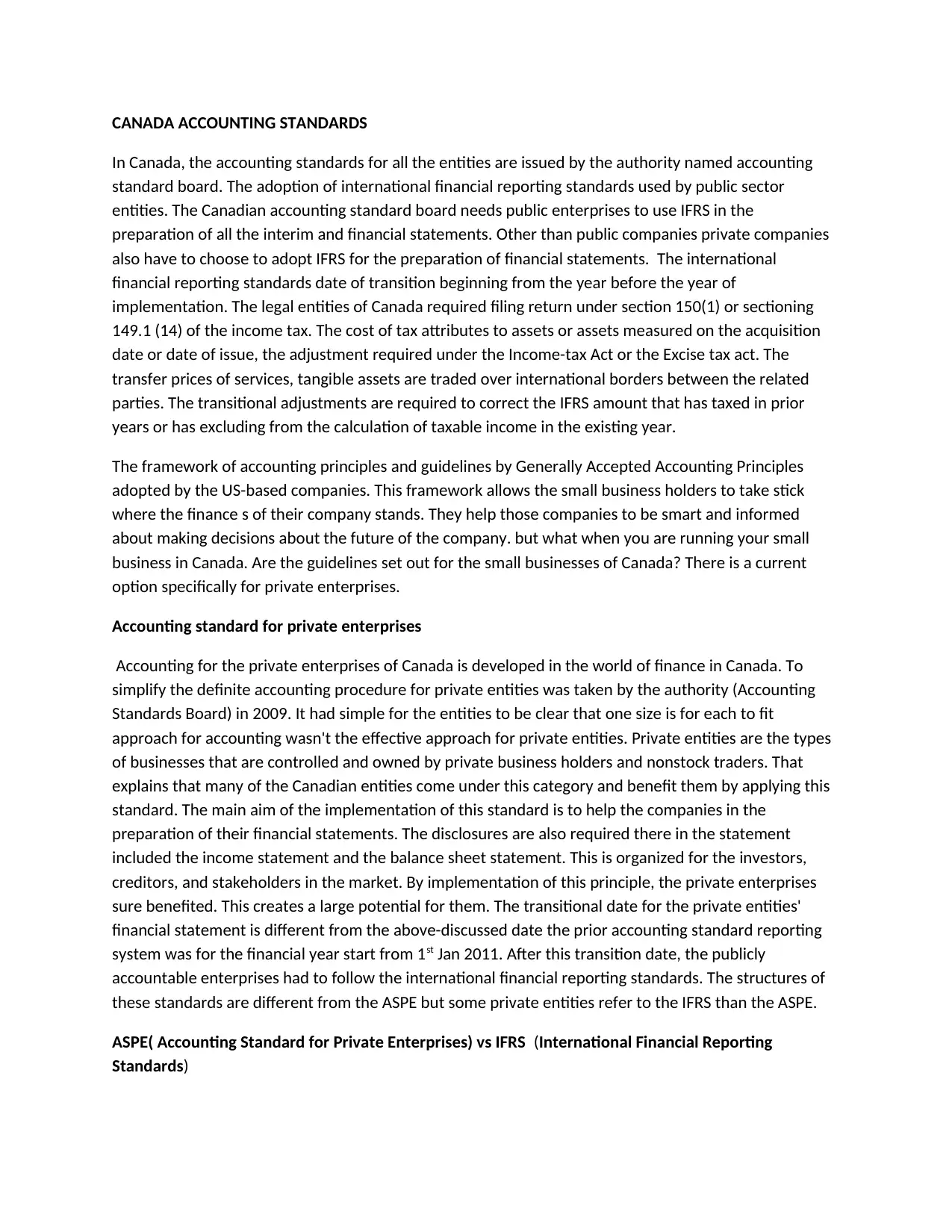
CANADA ACCOUNTING STANDARDS
In Canada, the accounting standards for all the entities are issued by the authority named accounting
standard board. The adoption of international financial reporting standards used by public sector
entities. The Canadian accounting standard board needs public enterprises to use IFRS in the
preparation of all the interim and financial statements. Other than public companies private companies
also have to choose to adopt IFRS for the preparation of financial statements. The international
financial reporting standards date of transition beginning from the year before the year of
implementation. The legal entities of Canada required filing return under section 150(1) or sectioning
149.1 (14) of the income tax. The cost of tax attributes to assets or assets measured on the acquisition
date or date of issue, the adjustment required under the Income-tax Act or the Excise tax act. The
transfer prices of services, tangible assets are traded over international borders between the related
parties. The transitional adjustments are required to correct the IFRS amount that has taxed in prior
years or has excluding from the calculation of taxable income in the existing year.
The framework of accounting principles and guidelines by Generally Accepted Accounting Principles
adopted by the US-based companies. This framework allows the small business holders to take stick
where the finance s of their company stands. They help those companies to be smart and informed
about making decisions about the future of the company. but what when you are running your small
business in Canada. Are the guidelines set out for the small businesses of Canada? There is a current
option specifically for private enterprises.
Accounting standard for private enterprises
Accounting for the private enterprises of Canada is developed in the world of finance in Canada. To
simplify the definite accounting procedure for private entities was taken by the authority (Accounting
Standards Board) in 2009. It had simple for the entities to be clear that one size is for each to fit
approach for accounting wasn't the effective approach for private entities. Private entities are the types
of businesses that are controlled and owned by private business holders and nonstock traders. That
explains that many of the Canadian entities come under this category and benefit them by applying this
standard. The main aim of the implementation of this standard is to help the companies in the
preparation of their financial statements. The disclosures are also required there in the statement
included the income statement and the balance sheet statement. This is organized for the investors,
creditors, and stakeholders in the market. By implementation of this principle, the private enterprises
sure benefited. This creates a large potential for them. The transitional date for the private entities'
financial statement is different from the above-discussed date the prior accounting standard reporting
system was for the financial year start from 1st Jan 2011. After this transition date, the publicly
accountable enterprises had to follow the international financial reporting standards. The structures of
these standards are different from the ASPE but some private entities refer to the IFRS than the ASPE.
ASPE( Accounting Standard for Private Enterprises) vs IFRS (International Financial Reporting
Standards)
In Canada, the accounting standards for all the entities are issued by the authority named accounting
standard board. The adoption of international financial reporting standards used by public sector
entities. The Canadian accounting standard board needs public enterprises to use IFRS in the
preparation of all the interim and financial statements. Other than public companies private companies
also have to choose to adopt IFRS for the preparation of financial statements. The international
financial reporting standards date of transition beginning from the year before the year of
implementation. The legal entities of Canada required filing return under section 150(1) or sectioning
149.1 (14) of the income tax. The cost of tax attributes to assets or assets measured on the acquisition
date or date of issue, the adjustment required under the Income-tax Act or the Excise tax act. The
transfer prices of services, tangible assets are traded over international borders between the related
parties. The transitional adjustments are required to correct the IFRS amount that has taxed in prior
years or has excluding from the calculation of taxable income in the existing year.
The framework of accounting principles and guidelines by Generally Accepted Accounting Principles
adopted by the US-based companies. This framework allows the small business holders to take stick
where the finance s of their company stands. They help those companies to be smart and informed
about making decisions about the future of the company. but what when you are running your small
business in Canada. Are the guidelines set out for the small businesses of Canada? There is a current
option specifically for private enterprises.
Accounting standard for private enterprises
Accounting for the private enterprises of Canada is developed in the world of finance in Canada. To
simplify the definite accounting procedure for private entities was taken by the authority (Accounting
Standards Board) in 2009. It had simple for the entities to be clear that one size is for each to fit
approach for accounting wasn't the effective approach for private entities. Private entities are the types
of businesses that are controlled and owned by private business holders and nonstock traders. That
explains that many of the Canadian entities come under this category and benefit them by applying this
standard. The main aim of the implementation of this standard is to help the companies in the
preparation of their financial statements. The disclosures are also required there in the statement
included the income statement and the balance sheet statement. This is organized for the investors,
creditors, and stakeholders in the market. By implementation of this principle, the private enterprises
sure benefited. This creates a large potential for them. The transitional date for the private entities'
financial statement is different from the above-discussed date the prior accounting standard reporting
system was for the financial year start from 1st Jan 2011. After this transition date, the publicly
accountable enterprises had to follow the international financial reporting standards. The structures of
these standards are different from the ASPE but some private entities refer to the IFRS than the ASPE.
ASPE( Accounting Standard for Private Enterprises) vs IFRS (International Financial Reporting
Standards)
Paraphrase This Document
Need a fresh take? Get an instant paraphrase of this document with our AI Paraphraser
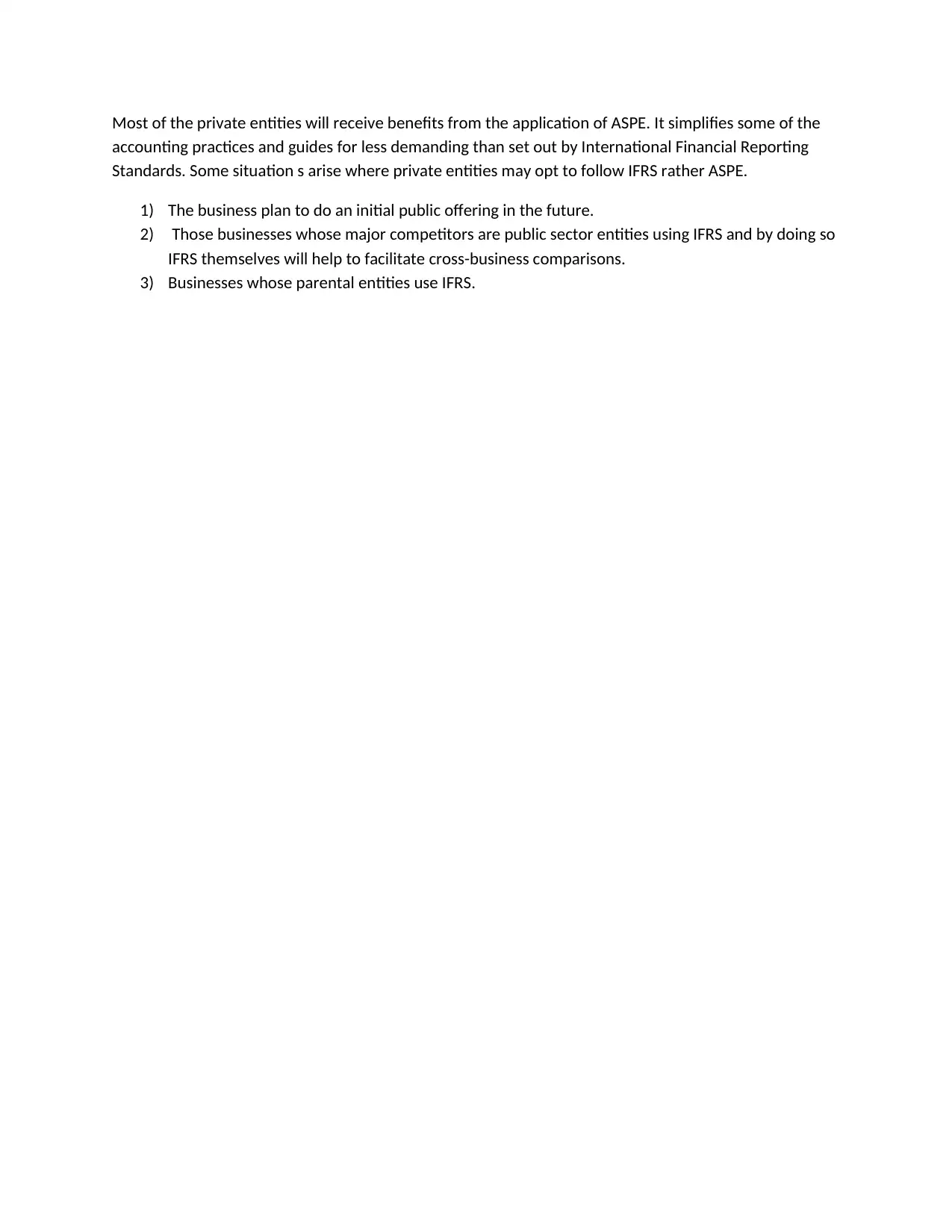
Most of the private entities will receive benefits from the application of ASPE. It simplifies some of the
accounting practices and guides for less demanding than set out by International Financial Reporting
Standards. Some situation s arise where private entities may opt to follow IFRS rather ASPE.
1) The business plan to do an initial public offering in the future.
2) Those businesses whose major competitors are public sector entities using IFRS and by doing so
IFRS themselves will help to facilitate cross-business comparisons.
3) Businesses whose parental entities use IFRS.
accounting practices and guides for less demanding than set out by International Financial Reporting
Standards. Some situation s arise where private entities may opt to follow IFRS rather ASPE.
1) The business plan to do an initial public offering in the future.
2) Those businesses whose major competitors are public sector entities using IFRS and by doing so
IFRS themselves will help to facilitate cross-business comparisons.
3) Businesses whose parental entities use IFRS.
1 out of 8
Related Documents
Your All-in-One AI-Powered Toolkit for Academic Success.
+13062052269
info@desklib.com
Available 24*7 on WhatsApp / Email
![[object Object]](/_next/static/media/star-bottom.7253800d.svg)
Unlock your academic potential
Copyright © 2020–2025 A2Z Services. All Rights Reserved. Developed and managed by ZUCOL.




